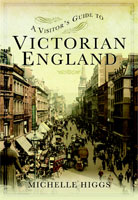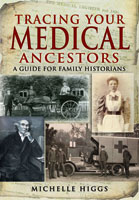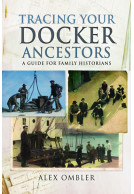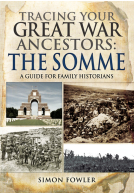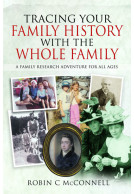Tracing Your Ancestors in Lunatic Asylums (Paperback)
A Guide for Family Historians
Imprint: Pen & Sword Family History
Series: Tracing Your Ancestors
Pages: 196
Illustrations: 40
ISBN: 9781526744852
Published: 14th November 2019
(click here for international delivery rates)
Need a currency converter? Check XE.com for live rates
| Other formats available | Price |
|---|---|
| Tracing Your Ancestors in Lunatic… ePub (11.8 MB) Add to Basket | £6.99 |
How can you trace forebears who were patients in lunatic asylums and find out about their lives? What sources can you consult to discover their personal histories and gain an insight into their experiences? In this concise, accessible handbook, Michelle Higgs answers these questions. She provides a fascinating introduction to the subject and gives readers the means to explore the records for themselves.
She concentrates on the period from the eighteenth century through to 1948 when the National Health Service was founded and looks in particular at the Victorian era which is the most popular period for research. Using original records, contemporary accounts, photographs, illustrations and case studies of real individuals, she brings the story of the asylums and their patients to life.
Different types of institution are described such as private madhouses, county lunatic asylums, facilities for idiots and imbeciles, and military mental hospitals. Chapters look at the admission procedures and daily routine of patients, plus different kinds of mental illness and how they were treated – for instance, those with depression or mania, criminal lunatics, mothers with puerperal insanity, epileptics and soldiers suffering from shell shock. There are sections on the systems in Scotland and Ireland, as well as England and Wales. Information is provided on all the relevant sources, from wills and the census to casebooks and admission and discharge registers.
"Whether you want to find an ancestor from your family in an asylum, have a general interest in mental health, or you are a genealogist or a student, this book is a very enjoyable read, filled to the brim with facts, personal dramas and reference resources."
Society of Genealogists
Featured in the
Cumbria Family History Society Newsletter
Featured in
Newsletter of the Family and Community Historical Research Society, Feb 2021
At £14.99 this book is a useful in depth account of the nature and work of British mental institutions for those considered insane. If, like me, you have a relative who was incarcerated in an asylum, you will better understand how the stigma and shame of mental illness and the resultant treatment that shaped their lives.
Essex Family Historian, December 2020
This is an excellent book on the subject, very well worth reading if this is what you want to get in to. Credit to the author Michelle Higgs who has clearly done a lot of research and there are many links to be found.
UK Historian
I would recommend this book if you just interested in lunatic asylums and wanted to find out more about them as well, as much of the book is based on that area.
For the Love of Books
If you do want to find out more about your own family but don’t know where to start the sources section of this book would be very beneficial. Overall I would recommend this book no matter what your initial interest in the book was as it was a very interesting read.
Read the full review here
If you want to understand what life was like for your ancestors with mental issues, this is the book!
Lost Cousins
Read the full review here
In this book, regular WDYTYA? Magazine contributor Michelle Higgs deals with the complex ways in which the treatment of the most vulnerable was influenced not only by the era, but also by factors such as geography, age, class, gender and the severity of their illness.
WDYTYA? Magazine, February 2020 - reviewed by Ruth A Symes, Tracing Your Ancestors Through Letters and Personal Writings
As featured in
East Yorkshire FHS
As featured in
Bristol and Avon FHS
I found the book full of helpful information and guidance, but as a very pleasing bonus, also a fascinating read.
Grace Ancestry
Read the full review here
"This is a very helpful book. It reviews the current literature and provides useful advice on accessing and using sources."
Historical Association
As featured in
"If your primary focus is on social history, there is much of interest in this book"
Alde Valley Suffolk Family History Group
An engaging read that I highly recommend.
Register of Qualified Genealogists
Read the full review here
Impressively informative, expertly organized and presented, "Tracing Your Ancestors in Lunatic Asylums: A Guide for Family Historians" is a unique and unreservedly recommended addition to personal, professional, community, college and university library Genealogical Research collections and supplemental curriculum studies lists.
Midwest Book Review
Read the full review here
There were several times, when we were researching our own ancestors, that we came upon the term "lunatic" on the census return sheets from the mid-1800s onwards. None that applied to our own family, thankfully, but at one point, I forget when, the term was used to describe inmates of workhouses etc. This is a fascinating book, Michelle points you in the right direction for discovering your "lunatic" ancestors in one of the best books in the series.
Books Monthly
You will discover how the law and practices changed over the years. Numerous cases are used for illustration. There are helpful appendices on terminology, websites, places to visit, a four-page bibliography and a ten-page index.
Canada's Anglo-Celtic Connections, John D Reid
Although learning about your ancestor's situation may not bring much joy this clear readable guide will provide insight. Highly recommended.
Read the full review here
I was interested in this book as an ancestor died in Gloucester asylum in 1879. I have his case notes, but was curious to find out more about the conditions he would be living in and what treatments he would be given. Regardless of my ancestor interest, I found the book absolutely fascinating. The reasons for someone being locked up in these institutions were sometimes scary and people tended to stay in them for many years. The case studies included are heart-rending at times.
Amazon Customer, Jayne
The book is presented in easily digestible chapters and the source notes, websites, places to visit and bibliography are fantastic. I expected to dip into this book to just discover more about my ancestor, but found myself reading every word. Highly recommended.
Read the full review here
It is a poignant testimony to the often heartbreaking realities of mental heathcare in the past.
NetGalley, Annie Buchanan
Author Q&A as featured by
Family Tree, December 2019
It provided a great insite into asylums in the 1800’s and what their patients had to endure.
NetGalley, Nicola Barker
Rating: 5 out of 5 stars
NetGalley, Deanne Patterson
This is absolutely fascinating and I've learned so much from it.
Written about Victorian lunatic Asylums it's a wealth of information.
Great detail is given is given about asylums,daily diets,beliefs of how the patients should be cared for and tracing ancestors in asylums. Now these are asylums in the UK, none are listed for this time period in the US.
Real life heartbreaking cases are presented detailing daily life on the inside and how different mental illnesses were treated including things today we'd never institutionalize a person for like dementia. Mental illnesses were so misunderstood back then, still are to a degree but people would be left to languish in there for a lifetime.
It went on to explain different types of mental illnesses and how they were treated.
Different types of institution are described such as private madhouses, county lunatic asylums, facilities for idiots and imbeciles, and military mental hospitals.
Rating: 5 out of 5 stars
NetGalley, Carolyn Farrell
For anyone with even a remote interest in Victorian lunatic Asylums, this is an absolutely fascinating book.
In addition to providing a wealth of information about the asylums, the treatment of mental illness, and tracing ancestors in asylums, the book provides absolutely heartbreaking case studies of actual patients. Reading how these unfortunate individuals found themselves committed for what would now be seen as totally treatable mental or emotional issues, and how many languished there till they died decades later, is horrific. These include the story of Ann Rebecca, who died in 1875, at the age of 88, having spent the previous 65 years in the asylum. There are numerous photos of asylum patients along with illustrations and photos of the asylums themselves and life within them.
For those wanting to trace their ancestors, the book provides information on useful websites and places to visit, along with information on problems you might run into, such as that such was the stigma with regard to mental illness that often the full name of the patient was not recorded in the census.
I cannot recommend this book highly enough to anyone interested in mental health, social history, asylums or geneology. An absolutely fascinating read, my favourite non fiction of 2019 so far.
A very interesting book.
NetGalley, Kirsten McEvoy
Really liked this book! It was extremely informative to a degree you don't see enough when it comes to the era of asylums!
NetGalley, T.B. Caine
I can't say too much because it is a historical read, so a lot just has to be left to you to read yourself. But if the subject matter interests you, you really need to check it out!
Higgs provides a highly readable discussion on the institutionalization of British Isles persons suffering from a variety of mental disorders.The majority of institutions discussed are in England, Scotland, or Wales. Higgs shows how attitudes toward the mentally ill evolved over time. The narrative includes several case studies of individuals, providing a list of sources used in each sketch. Near the end she discusses record availability, providing a few examples. As a genealogist, I wish this section had been expanded to include additional record images. Genealogists with family members spending time in an asylum in the United Kingdom will find this book helpful to their research.
NetGalley, Lori Thornton
More than just a simple guide to finding relatives... instructive and helpful.
NetGalley, Nureeni Lem
This book will be of enormous benefit to residents of Great Britain and perhaps other European nation's.
NetGalley, Julia Smith
This is a very informative, straight forward book which explores the history of mental asylums and many of the people who were held in them... All in all, this is a pretty good guide if you would like to learn more about lunatic asylums.
NetGalley, Amanda Lily










